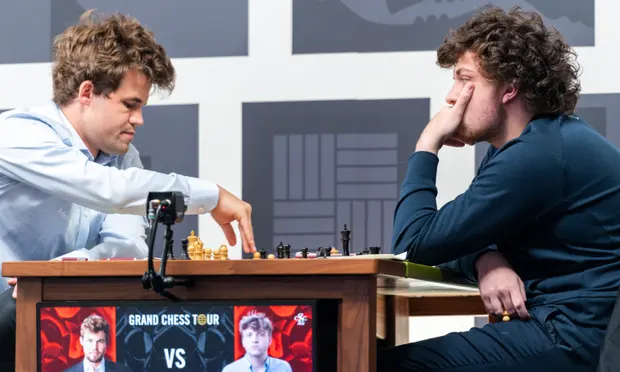Niemann v Carlsen chess cheating controversy is a ‘tragedy’ for both sides.
Niemann v Carlsen chess cheating controversy is a ‘tragedy’ for both sides. An investigation has revealed that American youngster Hans Niemann received “illegal assistance” in more than 100 internet chess games, and four of the world’s top 100 grandmasters have also privately confessed to cheating, further rattling the chess community.
Over a month ago, world champion Magnus Carlsen withdrew from the $500,000 Sinquefield Cup after losing to Niemann before dropping cryptic hints that his opponent may have cheated. The 72-page report by Chess.com is the latest twist in the tale.
Since then, rumors of cheating with vibrating anal beads have spread like wildfire, casting a pall of mistrust over the sport. With many viewers perhaps thinking it’s an oxymoron, the hashtag #chessdrama has become a frequent trend on social media.
Niemann has strongly denied any wrongdoing in his over-the-board encounters, including those against Carlsen. But last month, he came clean about cheating in online competitions twice when he was 12 and 16. However, Chess.com claims to have uncovered 11 instances, spanning more than 100 encounters, in which he cheated.
An impartial chess cheat detection expert, Ken Regan, “has indicated his view that Hans cheated during the 2015 and 2017 Titled Tuesdays, as well as other matches against other professional players in 2020,” the report adds.
Statements
Although “a lack of clear statistical evidence that he cheated in his game with Magnus or any other over-the-board games,” the study calls Niemann’s meteoric rise into doubt.
“Hans became the quickest rising top player in classical, over-the-board chess in modern recorded history,” it says.
Some support Carlsen’s decision to speak out against a potentially catastrophic threat. In contrast, others argue that he was reckless to use a nuclear weapon without concrete evidence of cheating in over-the-board matches.
“Anyone seeking for a clear-cut, good guy versus bad guy narrative here is going to be disappointed,” Scottish grandmaster Jonathan Rowson told the Guardian. Tragically, there is truth on both sides of this issue. People have a right to be upset by Hans’s online infidelity, but I disagree that he is doomed to a life of deceit because of it.
And the other huge issue is that Magnus ruined a tournament and stunned the chess world by accusing Niemann of cheating against him, a charge for which he has zero evidence. The results of the Chess.com inquiry prove my point.
Declarations
According to Chess.com, “less than 0.14% of players cheat” using anti-cheat software. However, they also claim to have captured “hundreds of titled players” and that four top 100 grandmasters have admitted to cheating.
But Rowson wonders why Niemann is getting all the attention in the chess world. “Hans isn’t the only top player to cheat online; there are many others. You may have a scapegoating process in which Hans is made to feel responsible for the entire systemic issue.
Meanwhile, when asked about Carlsen’s behavior, English chess champion Daniel King gave Rowson a similar judgment.
To paraphrase what King said, “Carlsen has virtually thrown Niemann under the bus and everyone else piled in.” To each his own, but if he did it before the Sinquefield Cup, that’s understandable. But doing so after a loss makes him appear bitter and ungrateful. The entire game, a camera was focused on Niemann. Carlsen’s performance was subpar. Plus, Niemann’s performance was not flawless.
Remarks
But other of the strongest grandmasters in the world have come out in support of Carlsen, notably the Russian Ian Nepomniachtchi, who is mentioned in the Chess.com article as a victim of Niemann.
Nepomniachtchi said, “I don’t believe in some huge transformations” about the Americans. “Transformation is not something I believe in.” Despite the uproar, Niemann has not been banned from playing over-the-board chess, and he was back in action on Wednesday in the first round of the US Chess Championship, where he won his first game against Christopher Yoo, a 15-year-old.
But just before Niemann made his first move, Russian grandmaster Peter Svidler questioned if the sport was severe enough on cheaters.
To paraphrase, “I’m a bit of a hardliner on this,” he stated. I don’t see much of a difference between in-person and remote cheating. I believe the chess community has been much more lenient and forgiving of internet cheating than it ought to be.

